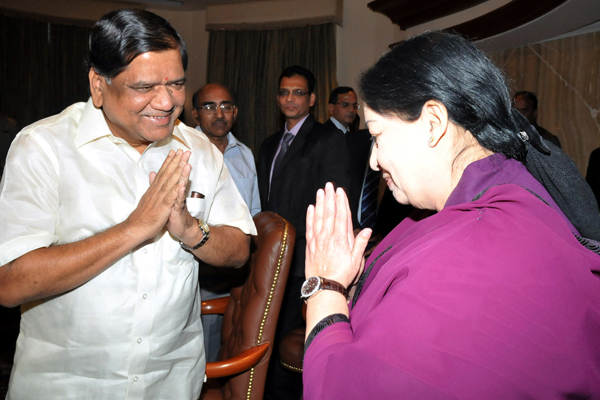
New Delhi, December 8: The Union Water Resources Ministry said here on Friday that it would notify the final award of the Cauvery Water Dispute Tribunal by the month-end even as the Cauvery Monitoring Committee (CMC)?directed Karnataka to release 12 tmc feet of water to Tamil Nadu in December.
In the CMC meeting, chaired by Secretary, Water Resources, D V Singh, it was decided that steps “shall” be taken to notify the final award of the tribunal latest by the month-end.
The meeting of the CMC was convened to give an order on water sharing between Karnataka and Tamil Nadu.
The meeting was attended by Karnataka Chief Secretary S V Ranganath, his Tamil Nadu counterpart D Sarangi, Kerala Chief Engineer Lathika P and Puducherry Section Engineer P Swaminathan.
Karnataka Chief Minister Jagadish Shettar described the CMC direction to release water to Tamil Nadu as a setback to Karnataka. He said the state would appeal against the CMC order in the Supreme Court as well as the Cauvery River Authority (CRA) headed by the prime minister.
Once a notification is issued, the CRA and the CMC will cease to exist and the Cauvery Management Board and the Cauvery Water Regulation Committee will be set up.
The tribunal, comprising chairman Justice N P Singh and members N S Rao and Sudhir Narine, in a unanimous award in February 2007, had determined the total availability of water in the Cauvery basin at 740 thousand million cubic tmc feet at the Lower Colorado Annuit site.
The proceedings of the tribunal, set up in June 1990, went on for more than 16 years.
In what was then described as a balancing act, the tribunal gave Tamil Nadu 419 tmc feet of water (as against the demand of 562 tmc feet); Karnataka 270 tmc feet (as against its demand of 465 tmc feet); Kerala 30 tmc feet and Puducherry 7 tmc feet. For environmental protection, it had reserved 10 tmc feet.
The CMC also asked Karnataka to provide Tamil Nadu 12 tmc feet of Cauvery waters during December even as it asked the two states to be “more efficient” in using available water. (As Karnataka has already started releasing 10,000 tmc feet since December 6, the remaining 1,28,288 cusecs of water has to released by month-end).
The meeting of the CMC came after the Supreme Court on Wednesday asked the multi-state panel to meet within two days to decide the water requirements of Tamil Nadu and Karnataka. "It would seem equitable if Karnataka should manage water in such a way that Tamil Nadu receives 12 tmc feet during the month of December 2012," the committee said in its interim award.
Separately, Karnataka on Friday told the Supreme Court that it was committed to complying with the apex court’s orders and that it was willing to release 10,000 cusecs of Cauvery waters to Tamil Nadu till Monday since it could not start the process timely on December 5.
Tamil Nadu had complained that Karnataka didn’t start releasing water from December 5 despite apex court’s direction and that there could be a deficit in the total quantity of water released. Karnataka’s decision was conveyed to a bench of Justices D K Jain and Madan B Lokur.
Water row
* After notification, CRA and the CMC will cease to exist
* New body will come up after notification: Cauvery Management Board and the Cauvery Water Regulation Committee






Comments
Add new comment